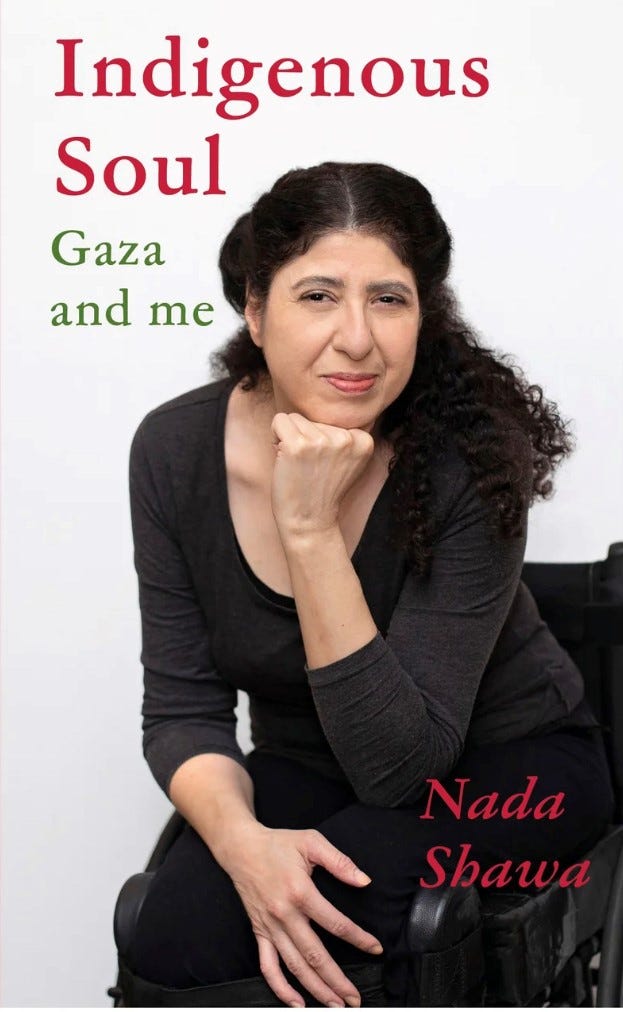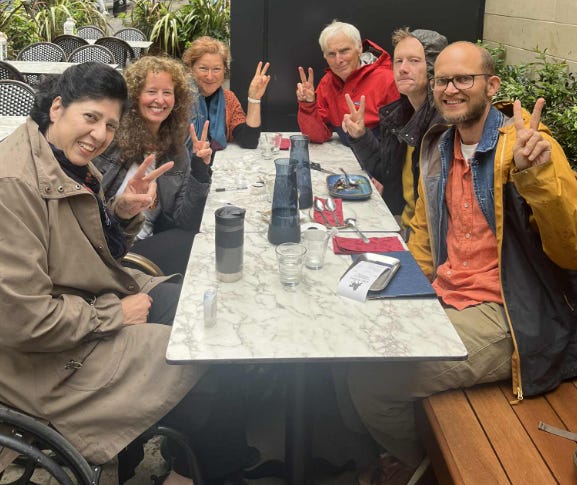'I’ve lost more than 150 members of my family’
The remarkable story of a woman helping organise a peaceful protest for Gaza
It is a jaw-dropping moment. Nada Shawa – one organiser of a peaceful humanitarian protest against Israel’s brutal campaign in Gaza being held in Edinburgh today – has just told the Inquirer of the numbers lost from her extended Palestinian family.
We had asked if the figure we had been told was correct. Sixty-eight couldn’t surely be right? “It was 96 earlier in the summer - that we knew about - but sadly with the ongoing violence it is now more than 150.”
The quietly spoken writer is quick to point out her extended family is large, having lived in their homeland for centuries. “This is not unusual at all,” she adds. “It is the same for many, many families. In fact, some families have basically been wiped out.”
A further explanation of why she cannot be certain of the number of her relatives who have died adds another layer of shock. “People do their best to register the deaths when they can, but so many are simply missing, or lying under rubble. It is not possible to be exact in the numbers.
“My heart absolutely breaks, watching Gaza being obliterated. It is a grief that cannot be explained.”
Signs of protest
White Flowers for Gaza is a peaceful, humanitarian event which is taking place from 10am till 4pm in Princes Street Gardens, near the Scott Monument, today. It is planned that Nada will lay a wreath at noon. It has been organised by a small group of local people with no political affiliation, who are simply horrified and outraged at the scenes they are witnessing.
People interested are being asked to place small white flowers, which are being made by volunteers, onto which they can attach the name of one of the estimated 20,000 children killed in Gaza so far.
One of those volunteer organisers is yoga teacher Susannah Dean. Her increasing despair was shared by her daughter, who graduated from the University of Edinburgh recently and briefly held up a small sign in protest to loud applause after receiving her diploma.
Susannah, in the audience, proudly responded by holding up her own sign “Against Genocide” and was shocked to be asked “very politely, it must be said” to leave. “I couldn’t believe it. I was being asked to leave my daughter’s graduation for very briefly and respectfully holding up a sign that simply said I am against genocide. It seemed extraodinary to me.”
The group of organisers have met regularly to bring the event to life. “It is absolutely not a political event, but humanitarian. We wanted to provide a space where people who are opposed to the genocide that is happening in Gaza could come together to express their grief, or their anger, or whatever emotions they are feeling.”
Nada has worked with the group in organising the event. She said: “I take comfort from the solidarity of ordinary people. They know they are witnessing human tragedy on a massive scale, and they have no interest in seeking gain or taking up political positions and they simply follow their own conscience.”
“We are human”
She left her home in Gaza and her family more than 40 years ago, to attend a residential boarding school in Scotland. She has cerebral palsy, and her family believed her opportunities to live a better life were greater away from the tensions of her homeland.
“I do not know how my life might have turned out if I had stayed in Gaza, but it would have been difficult to have an independent life. I have had such support here in Scotland. By the time I had finished school, it was not safe to return. I continued my studies here and applied for and gained UK Citizenship. But I have always kept in close contact with my family and close friends back in Gaza, visiting regularly.”
She has written, and performed, to increase awareness of the situation in Gaza and the culture of the Palestinian people for some time.
“That has evolved naturally, as people have expressed interest of knowing more about Palestine. It is about saying to people ‘I am here, I exist.’ Like all the other people of the world, we are human.” Her poetry and prose memoirs “Indigenous Soul, Gaza and Me” is being launched at Portobello Book Festival on 5 October at 3pm in Portobello Library.
UK has unique responsibility
She hopes that events like White Flowers for Gaza, while non-political, will increase the pressure on our political leaders to act to end the killing, and points to the UK’s unique responsibility given our history in events and in particular the Balfour Declaration of 1917.
In a letter to Lord Rothschild who was a leader of the Zionist Federation of Great Britain and Ireland, then Foreign Secretary Arthur Balfour wrote confirming that the British Government favoured the creation of “a national home for the Jewish people” in Palestine, and would work to facilitate that, laying the groundwork for the creation of the state of Israel in 1948. An almost legalistic caveat pledges “nothing shall be done which may prejudice the civil and religious rights of existing non-Jewish communities in Palestine.”
In recognising the State of Palestine in recent days, and acknowledging the rights of Palestinians to self-determination, the UK Government recognised its historic failure to uphold the pledge to protect Palestinian rights.
Nada said: “Without real action, the diplomatic words of recent days will simply be hypocrisy. The British Government has a real responsibility, which it has acknowledged. Now it needs to take action to stop the sale of arms to Israel. It is a complicity issue. It now needs to work to end the genocide, and not to simply wash its hands.”
Sarah too would like to see action taken. “ I became increasingly horrified and then angry at what seemed incomprehensible. Our Government needs to back up its words with deeds and end the genocide in Gaza. It needs to do what is right.”
Israel’s campaign in Gaza was their response to a co-ordinated attack by Hamas on October 7, 2023 in which several incursions into Israel saw the slaughter of 1200 Israelis, and the taking of 251 hostages – an attack by a UK Government designated terrorist group which drew international condemnation and outrage.
The Israeli Government maintains its actions are a war on Hamas, not on the Palestinian people, and are not genocidal in nature. Genocide is legally defined as acts intended to destroy, in whole or in part, a national, ethnic, religious or racial group through killing, causing serious harm, or inflicting conditions aimed at physical destruction. Israel vehemently denies this is its intent.
National governments are divided on whether they accept that Israel is committing genocide or not – for example the US does not accept this, and the UK Government maintains it is for international courts to decide. But in recent weeks a special UN Commission announced there were grounds to conclude that genocide was being committed. This finding has been echoed by Amnesty International.
In addition to the huge number of deaths, including of women and children, critics have pointed in particular to the widespread destruction of infrastructure, the repeated forced movement of civilian populations, and in particular restrictions of aid which the UN backed IPC has said has contributed to famine in Gaza.
Regardless of legal definitions, the brutality of what is happening in Gaza is plain and uncontested. In Edinburgh today, a small group of people are inviting others who are unwilling to witness in silence to join them, simply as people who want to see the killing of other people ended. As South Africa’s anti-apartheid leader Bishop Desmond Tutu, told us: “My humanity is bound up in your humanity, for we can only be human together.”






Thanks for your great reporting